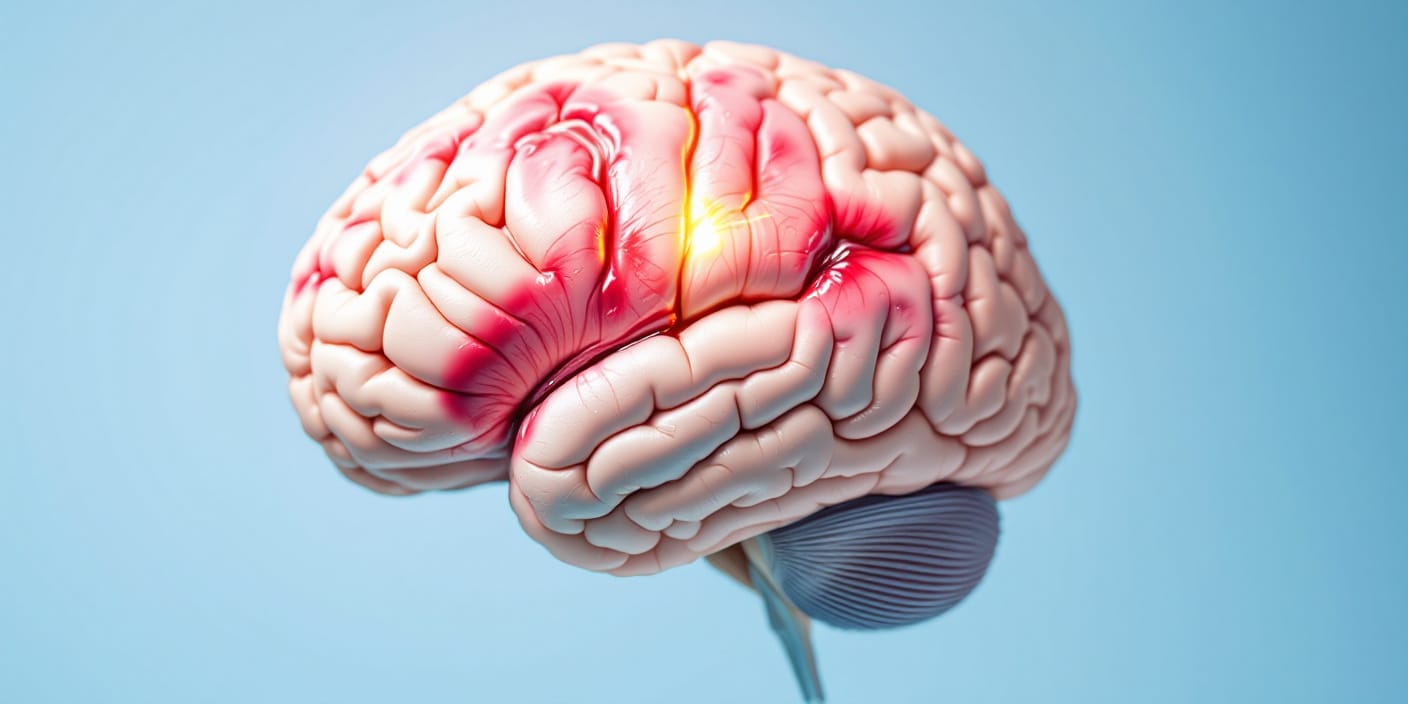Menopause is a fact of life for people who menstruate – periods need to stop eventually! So why don’t we talk about menopause more often? Even when we do talk about it, there seem to be a lot of misconceptions and myths. It’s time to bust them wide open!
1. Menopause symptoms are mostly hot flashes and mood swings
Though it may be true that hot flashes and mood swings are common symptoms of menopause, it is so much more than that! In fact, comprehensive lists of menopausal symptoms have over 100 different symptoms! Our naturopathic doctor and pelvic health physiotherapists at Triangle Physiotherapy can help educate you on the symptoms and their natural management.
2. Menopausal symptoms are unpreventable and a fact of life for all women
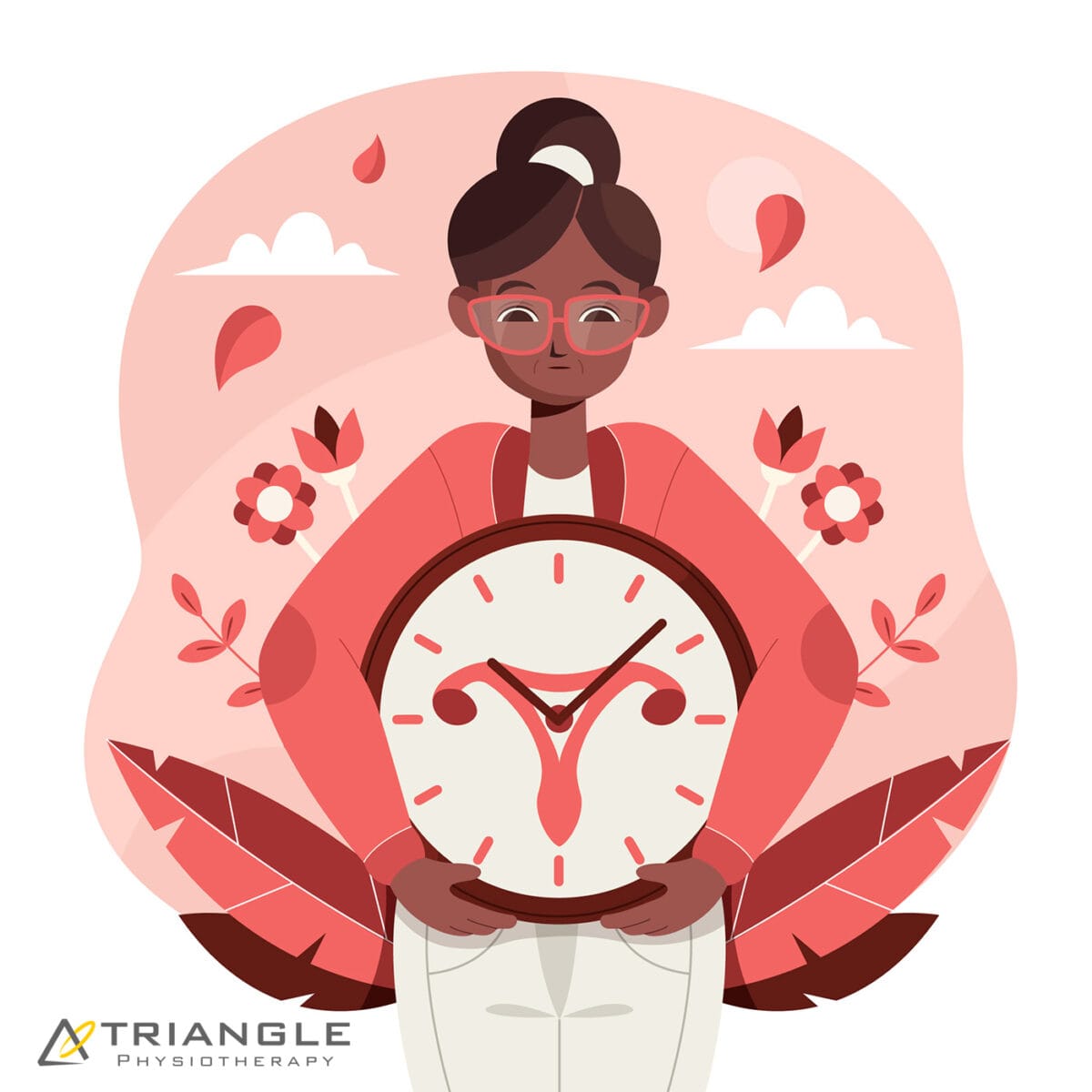
Some women have their periods stop without experiencing any symptoms at all! But even if you’re not one of those lucky people, there are things you can do to help this transitional time in your life to be more manageable. Talk to your naturopathic doctor to find out what you can do!
3. During peri-menopause, your periods always get lighter and farther apart
Though this may be true that eventually your periods become lighter and farther apart, it often doesn’t start that way. Many women find that when menopause begins, it’s actually the exact opposite of this. Periods can become more frequent and heavier before they eventually peter out.
4. The only mood changes that happen during menopause are irritability and mood swings
This is one of the most important myths for us to clarify. Yes, it’s true that irritability, anger, and mood swings are all potential symptoms of menopause. But anxiety and depression are part of what can happen during menopause, too. Instead of thinking of a menopausal woman as “cranky and short-tempered”, keep in mind that they may be going through anxiety and depression. Check up on menopausal women, and ensure they have the mental health support they often need at this time.
5. Menopause only happens after age 50
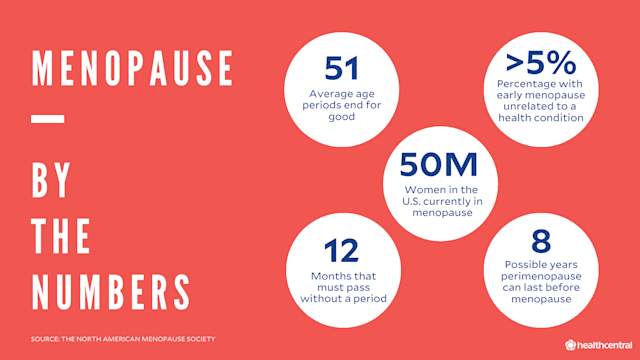
The most common age for menopause to happen is 50, but there is a lot of variance with this. In fact, some women can even go into menopause in their 30’s!
6. A hysterectomy always causes menopause
If you have a total hysterectomy, it is true that you will enter menopause post-surgery. But if your ovaries are not removed, then this isn’t the case. You would go through menopause naturally, and this could happen many years after your hysterectomy.
7. An IUD can cause you to skip over menopause
IUD’s have no impact on when you will go through menopause. What they can do, however, is help to manage some of the bleeding symptoms that can occur along with menopause.
8. Menopause marks the end of a woman’s sex life
Absolutely not! Women can have healthy sex lives well beyond menopause! Some symptoms of declining estrogen levels, such as lower libido and vaginal dryness, may make intercourse more difficult. However, there are natural options that can help to manage these symptoms to make intercourse more pleasurable for you. Be sure to speak to a naturopathic doctor if you would like to explore more of these options. Our pelvic health physiotherapists can also help you navigate the effects menopause can have on your sex life.
9. Menopause lasts a couple of years
It’s usually much longer than this. In fact, menopausal symptoms can begin up to 10 years before your periods actually stop!
10. Men go through menopause too
Nope. You may have heard of “andropause” or “manopause”, which refer to when testosterone levels decline in men. However, this testosterone decline happens very slowly, over several years. In menopause, the hormonal fluctuations are more drastic and happen much more quickly. This is why menopause can cause uncomfortable symptoms.
We hope this helped to clear up some of the common myths out there about menopause. If you have any further questions about menopause or women’s health, reach out to our naturopathic doctor at Triangle Physiotherapy and book an appointment today!
Bloating is a common issue that many of us experience at one point or another. Whether it’s caused by a heavy meal, certain foods, or even stress, feeling bloated can be uncomfortable and frustrating. The good news is that there are plenty of ways to relieve bloating and get back to feeling like yourself.
If you are feeling bloated, the Naturopaths and Acupuncturists at Triangle Physiotherapy are able to assess and find the root cause of your bloating.
In this blog, we’ll share 7 practical tips that can help reduce bloating and improve your digestive health.

1. Watch What You Eat
Certain foods are known to cause bloating, especially those that are difficult to digest or contain high levels of fiber. While fiber is important for your health, some foods, like beans, lentils, cruciferous vegetables (like broccoli and cauliflower), and dairy, can cause gas and bloating, especially if you’re not used to eating them in large amounts.
- Tip: Try keeping a food journal to track which foods may be causing bloating and experiment with cutting them out for a while. If dairy is an issue, consider switching to lactose-free or plant-based alternatives.
2. Stay Hydrated
It might sound counterintuitive, but drinking more water can actually help reduce bloating. When your body is dehydrated, it can hold on to excess water, leading to that uncomfortable, swollen feeling. Staying hydrated helps to keep your digestive system moving and can prevent water retention.
- Tip: Aim for about 8 glasses of water a day, or more if you’re active. Adding a squeeze of lemon or cucumber can make it more refreshing.
3. Eat Smaller, More Frequent Meals
Large meals can overwhelm your digestive system, leading to bloating and indigestion. Instead of eating three big meals a day, try splitting your meals into smaller, more frequent servings. This helps to regulate your digestive process and prevents excessive bloating after eating.
- Tip: Opt for 4–6 smaller meals throughout the day, and try to eat slowly to give your body time to digest properly.
4. Move Around After Eating
It’s tempting to slump on the couch after a large meal, but sitting still can actually make bloating worse. Moving around gently after eating helps stimulate your digestive system and can ease any discomfort.
- Tip: Go for a short walk after meals to help with digestion. Even a few minutes of movement can do wonders for reducing bloating.
5. Try Probiotics
Probiotics are beneficial bacteria that can help balance the gut microbiome and improve digestion. If your bloating is due to an imbalance of gut bacteria, taking a probiotic supplement or eating probiotic-rich foods like yogurt, kefir, sauerkraut, or kimchi might help ease the symptoms.
- Tip: Start with a mild probiotic and gradually increase your intake to avoid gas or discomfort. Be patient—it can take a few days or even weeks for probiotics to have their full effect.
6. Avoid Carbonated Drinks
The bubbles in carbonated drinks, including soda, sparkling water, and beer, can cause gas to build up in your stomach, leading to bloating. While it’s tempting to grab a fizzy drink, the air trapped in the bubbles can make you feel swollen and uncomfortable.
- Tip: Opt for still water or herbal teas instead. Ginger or peppermint tea can be particularly helpful in soothing your digestive system.
7. Mind Your Stress Levels
Believe it or not, stress can contribute to bloating. When you’re stressed, your body releases hormones that can slow down digestion and cause bloating. Practicing relaxation techniques like deep breathing, meditation, or yoga can help reduce stress and alleviate bloating.
- Tip: Try setting aside time each day for a short relaxation practice, even if it’s just 5–10 minutes of mindful breathing or stretching.
FAQs About Bloating
Q: Can I prevent bloating altogether?
While it’s not always possible to completely prevent bloating, you can reduce the frequency and severity by paying attention to your diet, staying hydrated, and managing stress. If you consistently experience bloating, it might be a good idea to consult with a healthcare professional to rule out underlying conditions like food intolerances or gastrointestinal disorders.
Q: Is bloating a sign of a serious health problem?
In most cases, bloating is a normal part of digestion and isn’t a cause for concern. However, if bloating is persistent, painful, or accompanied by other symptoms like significant weight loss, diarrhea, or vomiting, it could indicate an underlying health condition such as IBS (Irritable Bowel Syndrome), celiac disease, or a digestive disorder. It’s best to seek medical advice if you’re worried.
Q: What can I do if I feel bloated after every meal?
If bloating occurs after every meal, it could be related to how you’re eating, what you’re eating, or how your body is processing food. Try eating smaller meals, chewing your food thoroughly, and avoiding foods that cause gas. If the issue persists, consider keeping a food diary and discussing it with a healthcare provider or dietitian.
Q: Are there any natural remedies for bloating?
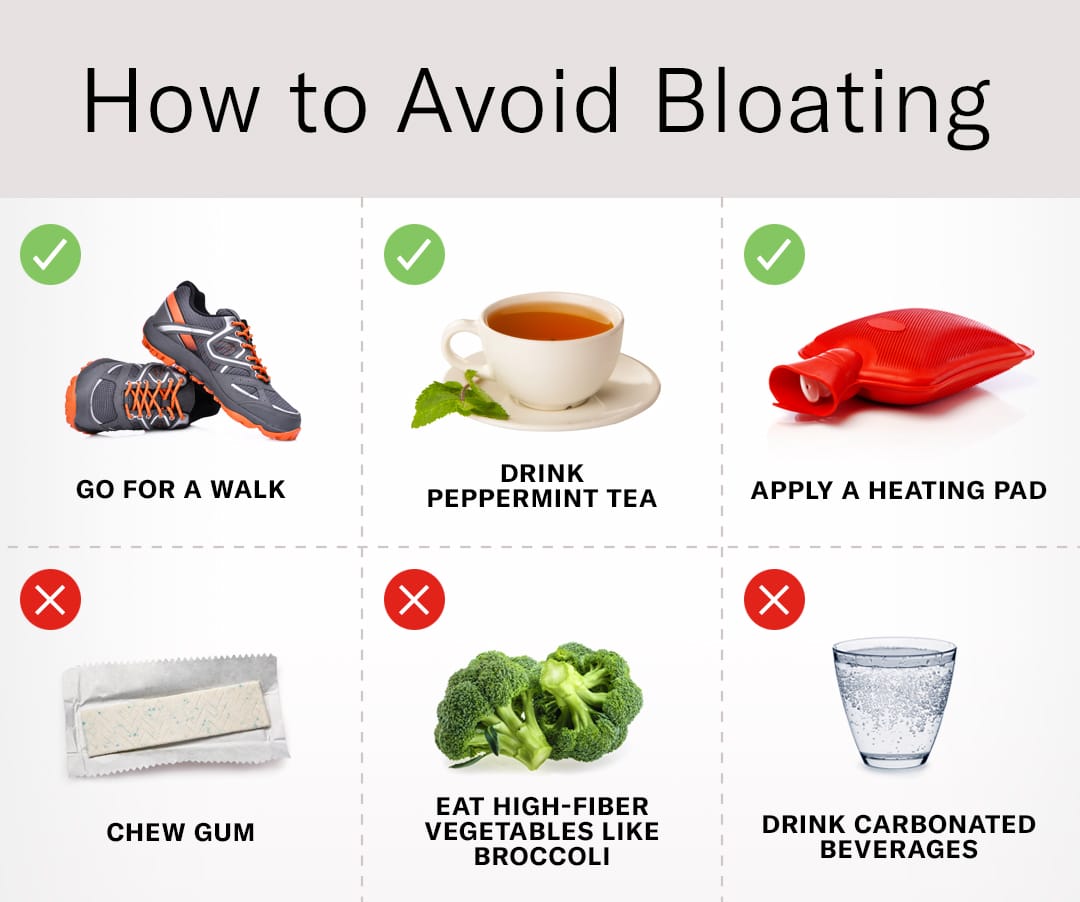
Yes! Several natural remedies may help relieve bloating, including:
- Ginger: Known for its digestive properties, ginger can help soothe the stomach.
- Peppermint tea: Helps to relax the digestive muscles and reduce bloating.
- Fennel seeds: Can help reduce gas and bloating when chewed or steeped in hot water.
Bloating is an issue that the Naturopaths and Acupuncturists at Triangle Physiotherapy can help you with. Book an appointment today!
Living in Canada, especially in cities like Etobicoke, means dealing with long winters and limited sunlight. Unfortunately, this impacts our Vitamin D levels. Many people aren’t aware of the importance of Vitamin D supplementation, often treating it like an optional vitamin similar to Vitamin C. However, Vitamin D is not as easily obtained from foods, making it vital to get it from other sources.
Our Naturopath in Etobicoke, Dr. David Gabriele talks about Vitamin D and it’s importance in this blog.
Why Is Vitamin D Important?
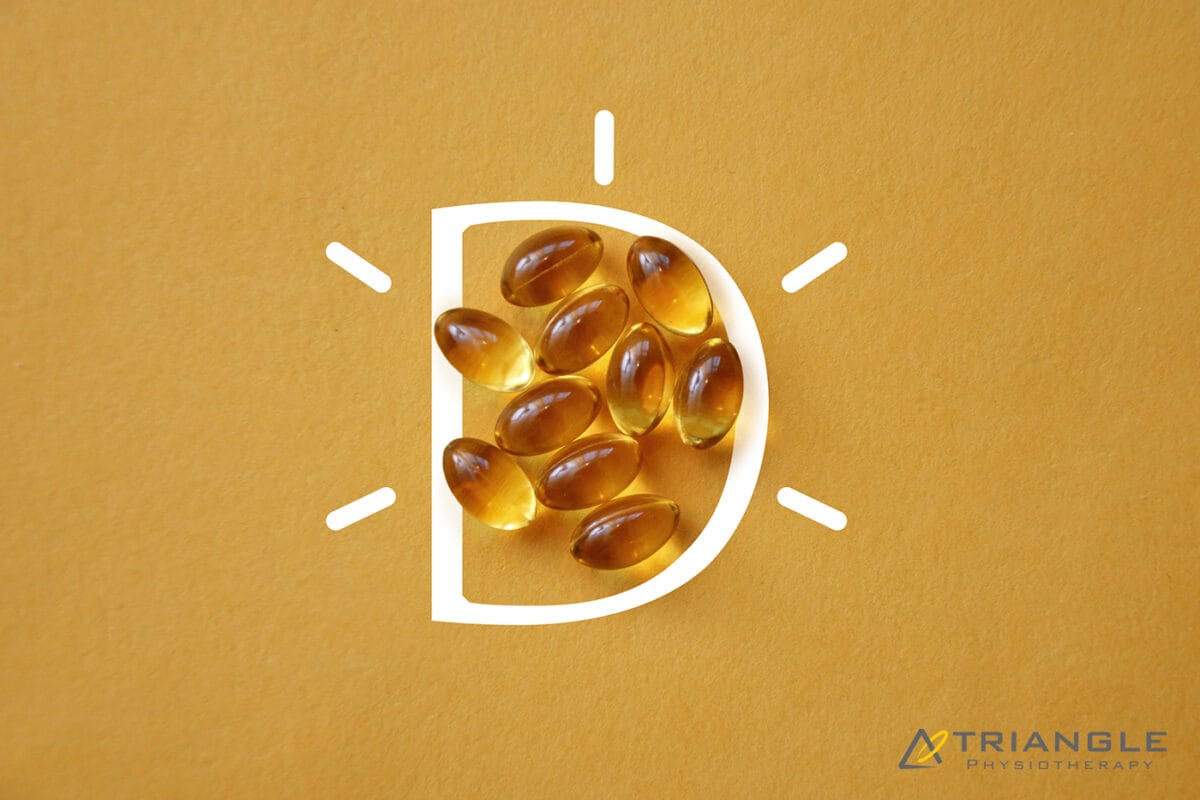
Vitamin D plays a crucial role in various bodily functions. Here’s what Vitamin D does and why maintaining optimal levels is essential:
Key Functions of Vitamin D
- Calcium & Phosphorus Balance
- Vitamin D helps in regulating calcium and phosphorus, which are necessary for maintaining strong bones. A deficiency can lead to bone density loss and chronic bone pain.
- Muscle Strength and Pain Reduction
- Low levels of Vitamin D can result in muscle weakness, cramps, and increased pain, which can affect daily activities and overall quality of life.
- Mood Regulation
- Vitamin D impacts mood and mental health. Deficiency has been linked to conditions like depression and anxiety, which are common concerns during the darker months in Etobicoke.
- Immune System Support
- A robust immune system needs adequate Vitamin D to function effectively. Low levels can increase the risk of infections and illnesses.
- Mitochondria Function and Energy Levels
- Vitamin D plays a role in the function of mitochondria, the powerhouse of cells, which can influence energy levels and combat fatigue.
- Blood Pressure and Insulin Regulation
- It also helps in regulating blood pressure and insulin sensitivity, reducing the risk of hypertension and Type 2 diabetes.
Risks of Vit D Deficiency
Due to the geographical location of Etobicoke and its long winter season, residents are at a higher risk of Vitamin D deficiency. Here are some health issues associated with low Vitamin D levels:
- Bone Density Loss & Chronic Pain
- Increased Muscle Weakness and Cramping
- Elevated Risk of Depression and Anxiety
- Higher Susceptibility to Infections
- Fatigue and Low Energy Levels
- Insulin Resistance and Risk of Type 2 Diabetes
- Increased Blood Pressure
Recommended Vitamin D Supplementation
The American Academy of Pediatrics advises all breast-fed and partially breast-fed infants to receive an oral vitamin D supplement of 400 IU/day. For children aged 1 to 13 years, a daily intake of 600 IU is recommended.
For adults, the general recommendation is 2000 IU/day. However, the required dosage may vary based on factors like:
- Diet
- Skin Pigmentation
- Age
- Body Weight
- Health Conditions
- Clothing Choices (especially in winter)
How to Boost Your Vit D Levels
Food Sources of Vitamin D
While supplements are often necessary, you can also get Vitamin D from dietary sources, such as:
- Fatty Fish (e.g., salmon, mackerel, tuna)
- Beef Liver
- Fortified Dairy Products
However, given Canada’s limited sunlight exposure, especially during winter, Vitamin D supplementation is generally recommended to ensure optimal health and disease prevention.
Get Your Vit D Levels Tested at Triangle Physiotherapy Etobicoke
At Triangle Physiotherapy Etobicoke, we understand the importance of maintaining adequate Vitamin D levels, especially for our clients dealing with chronic pain, muscle weakness, and other health conditions. If you suspect you might have a Vitamin D deficiency or are experiencing symptoms like fatigue, muscle cramps, or low mood, consider scheduling an appointment with one of our physiotherapists.
We can guide you on how to improve your Vitamin D levels through dietary adjustments, lifestyle changes, and appropriate supplementation.
Book Your Consultation Today!
Take charge of your health and well-being. Contact Triangle Physiotherapy Etobicoke to schedule an assessment and get personalized advice on Vitamin D supplementation.
In today’s world, more people are turning to holistic approaches to health and wellness. Naturopathic medicine emphasizes natural remedies and the body’s inherent ability to heal itself. The Naturopaths at Triangle Physiotherapy can do a detailed initial assessment of your health and provide a treatment plan that can help you live a healthy life.
Here are five compelling reasons to consider visiting a naturopathic doctor.
1. Personalized Healthcare Approach
One of the primary benefits of seeing a naturopathic doctor is the personalized approach to healthcare. Naturopaths take the time to understand your unique health history, lifestyle, and goals. This comprehensive assessment allows them to create tailored treatment plans that address not just symptoms but the root causes of your health issues.
Unlike conventional medicine, which often relies on standardized treatments, naturopathy emphasizes individualized care. This means you’re more likely to receive a treatment plan that resonates with your specific needs, helping you achieve optimal health in a way that feels right for you.
2. Focus on Prevention
Naturopathic doctors prioritize prevention over merely treating symptoms. They educate patients on lifestyle choices that can help prevent illness and promote long-term health. This proactive approach includes guidance on nutrition, stress management, exercise, and sleep hygiene.
By focusing on prevention, naturopathic doctors help you build a strong foundation for wellness, reducing the risk of chronic diseases and other health issues down the line. They empower you to take control of your health, fostering a sense of well-being and resilience.
3. Integration of Natural Therapies
Naturopathic medicine is rooted in the use of natural therapies to promote healing. Naturopathic doctors utilize a variety of modalities, including herbal medicine, homeopathy, acupuncture, and nutrition. These therapies work in harmony with the body, often with fewer side effects than conventional medications.
For those seeking alternatives to pharmaceutical drugs, naturopathy offers a wealth of natural options. Whether you’re dealing with digestive issues, hormonal imbalances, or chronic pain, a naturopathic doctor can help you explore safe and effective natural treatments.
4. Support for Chronic Conditions
Many individuals struggle with chronic health conditions that don’t seem to improve with traditional treatments. Naturopathic doctors are skilled at addressing these complex issues. They look at the whole person—mind, body, and spirit—considering how factors like stress, nutrition, and lifestyle contribute to your condition.
Whether you’re dealing with conditions like diabetes, autoimmune disorders, or anxiety, a naturopathic doctor can help create a comprehensive plan that addresses your unique challenges. By focusing on healing the body as a whole, you may find more effective relief and improved overall health.
5. Empowerment and Education
Finally, seeing a naturopathic doctor empowers you to take an active role in your health. Naturopathic practitioners emphasize education, providing you with the knowledge and tools to make informed decisions about your well-being.
This collaborative approach fosters a strong doctor-patient relationship, where you’re encouraged to ask questions and participate in your health journey. As you learn about your body and how to care for it, you gain confidence in making choices that promote your wellness.
visiting a naturopathic doctor offers a personalized, preventive, and holistic approach to health. With their focus on natural therapies and empowerment, naturopaths can guide you toward a healthier, more balanced life. If you’re looking for an alternative to conventional medicine or seeking support for chronic conditions, consider reaching out to a naturopathic doctor. Your path to wellness may just begin with a visit to one.
Click HERE to learn more about what a Naturopathic doctor can do for your health.
Concussions are common head injuries that can result from falls, sports accidents, or other trauma to the head. They disrupt normal brain function and may cause symptoms like headaches, dizziness, confusion, and fatigue. While conventional medicine often focuses on rest and symptom management, many people are now looking into natural, holistic methods to support recovery. One approach people consider is seeking the help of a naturopath.
What is a naturopath, and how do they approach health care?
A naturopath is a healthcare practitioner who uses natural remedies and holistic approaches to promote healing and overall well-being. Instead of focusing solely on symptoms, naturopaths work to address the root causes of illness and injury, considering lifestyle, diet, and mental health as part of the healing process. They often use a combination of natural therapies, including:
- Natural Medicine: Using plant-based remedies to support the body’s healing process.
- Nutritional Counseling: Recommending specific foods and supplements to boost recovery.
- Homeopathy: Treating injuries with highly diluted natural substances that trigger the body’s self-healing abilities.
- Lifestyle Modifications: Encouraging stress reduction, adequate rest, and gradual return to activity.
When dealing with concussions, a naturopath’s goal is to enhance the body’s natural healing abilities and reduce inflammation to promote brain recovery.
What is a Concussion?
Concussions are caused by an impact to the head or body that is associated with a mild traumatic brain injury that affects brain function. Effects are often short term and can include headaches and trouble with concentration, memory, balance, and sleep.

What is Post-Concussion Syndrome?
Symptoms of a mild traumatic brain injury can persist long after an injury. These symptoms may include headaches, dizziness, and problems with mood, concentration and memory. These symptoms can be improved with lifestyle adjustments, proper nutrition, stress management and supplements.
How doe Naturopaths approach Concussion Management
Naturopathic Medicine approaches concussion injuries from several modalities, and generally an ND will use which ever avenues of care are most appropriate for the individual.
1) Stress Management
Working with an ND to discuss how to remove or lessen stressors in your life can be a major benefit. Although some stressors are unavoidable, an ND can offer structured guidance on managing stress. Working to increase the quantity and quality of regenerative sleep, for example, is key for a healthy recovery. Breathing exercises are commonly taught to concussion patients as it gives them a practical means to regulate their stress and symptoms on their own.
2) Physical Activity
Discussing a gentle exercise routine, even if it’s just a daily short walk, can lead to much better outcomes in the long run. Gentle physical activity can relieve stress and offer great benefits to metabolic health. It can also offer an easy start to incorporate exercise into a person’s life whootherwise wouldn’t know where to start. Once the recovery process is underway, the exercise quantity and intensity can be slowly increased to return increased benefit.
3) Acupuncture
Acupuncture is a painless dynamic therapy that can offer many benefits to a concussion patient. The effects can be roughly divided into physical and psychological. Acupuncture can increase circulation, reduce inflammation, relax tense muscles & joints, and lessen pain. It can also be utilized to regulate a person’s sympathetic (stress) response, calm the mind, and offer relief from stress & anxiety and to help manage sleep.
4) Dietary Nutrition
A poor diet can throw off the mood and quality of life of anyone, however this is especially true for a person recovering from a concussion. An emphasis on a healthy diet is key to minimizing disruptive symptoms and accelerating recovery. In some cases, specific types of diets can be utilized to address the prevalence of certain symptoms and problems.
5) Supplementation
Natural health products can be expertly utilized by a qualified naturopathic doctor to address a wide range of concerns and ultimately to increase quality of life and speed up the recovery process. If needed, an ND may run bloodwork to look for specific markers related to the patients injury and general health. This information can be used to direct administration of supplements and to monitor progress.
Are naturopathic treatments safe for concussion recovery?Yes, naturopathic treatments are generally safe when administered by a qualified practitioner. However, it is important to have an integrative approach when recovering from a concussion. This means working with both conventional medical doctors and a naturopath to ensure that you are getting comprehensive care.It’s crucial to remember that naturopathic treatments should complement—not replace—medical care, especially if there are serious or worsening symptoms such as loss of consciousness, severe headaches, or prolonged confusion.
Naturopathic medicine offers a complementary and holistic approach to concussion recovery. While conventional medicine plays a crucial role in diagnosing and managing concussions, naturopaths focus on supporting the body’s natural healing processes with a combination of herbal remedies, nutrition, and lifestyle adjustments. By working alongside traditional healthcare providers, naturopaths can help individuals manage their symptoms, improve their brain health, and potentially speed up recovery.
If you’ve suffered a concussion, consider consulting a naturopath to explore natural ways to support your healing journey—just make sure to keep your healthcare provider informed and work with them to find the right balance of care.
Our Naturopath in Etobicoke, Dr. David Gabriele can help you recover from the lingering effects of a concussion. Book your appointment today!
Are you consuming too much sugar? Without even looking at your diet, I can say that the answer is probably yes. In this day and age, you’d be hard-pressed to find any food product without some kind of added sugar or sweetener in it. So unless you are making a conscious effort to avoid added sugar, chances are you’re having too much of it. The American Heart Association recommends the following:
6 tsp of added sugar daily for women
9 tsp of added sugar daily for men
The reality? On average, adults consume a whopping 22 tsp of added sugar daily. Teens are even worse, with an average of 34 tsp daily.
Why it’s not your fault
Your sugar addiction isn’t really your fault, and I’m not just saying that because of all the added sugars that companies dump into their food products. There is an evolutionary origin of eating with pleasure. Foods with a high energy density (small amount of food with lots of calories) tend to be more palatable. Humans have been known to crave sweetness from a young age. In fact, babies crave fruit long before they are exposed to added sugars in foods. So it’s in our nature to want sugary snacks… but we’ve gone overboard. Historically, refined sugars were only consumed in small amounts, but they now account for almost 20% of total caloric intake. In the 1800s, the average American consumed 18 pounds of dietary sugar per year. Today, the average American consumes 150 pounds in a year. That’s a 733% increase in sugar consumption! It used to be an evolutionary advantage to find foods that were high in caloric density, but we have gone way above and beyond what our bodies need and into the dangerous territory of sugar overconsumption.
Problems caused by sugar
Empty calories
When a food has empty calories, this means that there are lots of calories but not much nutritional benefit. For an example, let’s look at Strawberry Twizzlers. If you eat 4 of these (which is what is considered a “serving”), you are consuming 160 calories. This product has NO vitamins, NO enzymes, and NO fiber. By contrast, an example of a food with more “full” calories is an avocado. A regular-sized avocado has 160 calories, the same as those 4 Twizzlers. However, it also contains healthy fats, potassium, fiber, Vitamin C, Vitamin B6, and magnesium. So you can see how eating a fruit or vegetable gets you more bang for your buck in terms of calories consumed in relation to nutritional benefit. Sugar is giving you nothing but calories and all the problems listed below.
Cardiovascular disease
Sugar consumption leads to more risk factors for cardiovascular disease, such as increased blood pressure. Sugar also decreases your HDL (high-density lipoproteins), which is what people call your “good cholesterol”. Sugar can also lead to increased platelet adhesiveness, which means it is easier for your blood to form clots, leading to an increased risk of heart attack and stroke.
Infections
Infections feed off of sugar, which is why I often recommend that my patients cut down on their sugar intake when they are starting to get a cold. Fungal and bacterial infections love sugar the most, so it’s also good to cut back on sugar if you’re starting to get a yeast infection, a UTI, or an ear infection. Sugar also decreases immunity, so if you have an infection, all the sugar you are consuming will feed the infection AND lower your body’s ability to fight the infection. Double-whammy!
Cavities
Dental cavities are usually caused by acids that demineralize the tooth enamel. These acids are produced by a bacteria called Streptococcus mutans. And what did we just learn about bacteria? That’s right, it feeds off of sugar. This strain in particular loves glucose, fructose, lactose, sucrose, and maltose, which will help it to produce those tooth-decaying acids.
Inflammation
Sugar can contribute to inflammation in the body, which can manifest in any of the following ways: digestive upset, joint pain, skin irritation, respiratory issues, and even autoimmune disorder flare-ups. If you have any of these issues, try cutting back on the sugar in your diet and see if it helps.
I could go on and on…
Seriously, the amount of problems caused by sugar is astounding. Here are just a few more:
- Headaches
- Fatigue
- Confused hunger cues
- Digestive upset
- Mood swings
- Brain fog
- Increased body fat
- Depression
- Anxiety
- Acne
- Skin irritation
How is sugar so addictive?
It’s a vicious cycle! First, you eat sugar, which causes your blood sugar levels to spike. Insulin is released in the body to help drop your blood sugar levels. Your blood sugar levels drop, and this causes your appetite to increase and your body to crave the lost sugar high. So you eat sugar again. The cycle continues, over and over throughout the day. And each time you eat sugar, dopamine (the addiction hormone) is released in the brain. That big drop in blood glucose is what is called a “sugar crash” and can cause fatigue, brain fog, headaches, and mood swings. It also confuses the body’s hunger cues, since the body feels like it needs more food when in reality you are just craving sugar.
How does sugar cause weight gain?
Remember when I said that insulin is released in the body when you eat sugar? This insulin release signals the body to take sugar into the cells. If you have a diet that is high in sugar, the cells will be full and so sugar is converted to fat and stored in the body. So when you consume high-sugar food products, you are not only taking in lots of calories, but you are also storing more fat!
How do I avoid the sugar spike and crash?
One of the biggest problems with sugar is how quickly it gets into the bloodstream and how quickly it gets removed. We don’t want blood sugar or insulin to spike quickly. We are aiming for a slower process so that we don’t get the sugar high or ensuing sugar crash. One way we can do this is by combining fats with sugars, which improves the body’s ability to process sugar. For example, if you’re eating an apple, pair it with some nut butter. If you’re having oatmeal, add some nuts to it. If you’re eating toast (very carb-heavy), then put some avocado on it.
Which products have the most added sugars?
As I mentioned earlier, most food products do have added sugars. The top 5 sources of added sugars to really make sure you stay away from are:
- Sweetened beverages (this includes pop, iced tea, and specialty coffee drinks)
- Baked goods (cookies, pies, doughnuts, tarts, brownies, cakes, croissants)
- Dairy desserts (ice cream, frozen dairy bars, sundaes)
- Candy (gummies, chocolates, hard candies)
- Cereal
By now, the public is fairly well-informed about certain products and their sugar content. I’m sure you’ve heard of how horrifically high-sugar things like Red Bull, Coca-Cola, Mountain Dew, and Dairy Queen treats are. But not all high-sugar products are quite as obvious as those. Let’s look at some other food and beverage products you might want to stay away from, keeping in mind that the maximum amount of added sugars in a day is 24 g for a female and 36 g for a male.
- 1 bottle of SoBe Green Tea: 61 g of sugar
- 1 can of Arizona Iced Tea: 72 g of sugar
- 1 container of Yoplait Strawberry Yogurt: 27 g of sugar
This means that if you’re a female and you’re having that Yoplait for breakfast, you are getting more than your recommended daily intake of sugar just from the one container of yogurt!
Clearly, sugar can be sneaky, so it’s important to read labels. Look at the nutrition information table, specifically at the Sugar section and keep in mind what the daily maximum is for you. If you do eat something high in carbohydrates or sugars, try to pair it with a healthy fat to avoid the sugar high and crash.

If you would like healthy sugar-free recipes or more tips on how to control your blood glucose, click HERE to book an appointment for a Naturopathic Assessment with Dr. Corina Kibsey, ND today.
- Oakville Naturopath – Triangle Physiotherapy Oakville
- Naturopath in Mississauga – Triangle Physiotherapy Mississauga
- Downtown Naturopath – Triangle Physiotherapy King West
- Mississauga Naturopath – Triangle Physiotherapy Erin Mills
Article written by: Dr. Corina Kibsey, ND
We’ve all heard how good running can be for you. Running helps to lose weight, prevent disease, lower stress, strengthen joints, manage blood pressure… the list goes on and on. But there’s a surprising problem you may be experiencing if you’re a long-distance runner. It’s called leaky gut. I know it sounds gross, but if you’re a runner then it’s something to keep in mind. How do you know if you have a leaky gut? Read on to find out common symptoms and how to treat them.
What is a leaky gut, anyway?
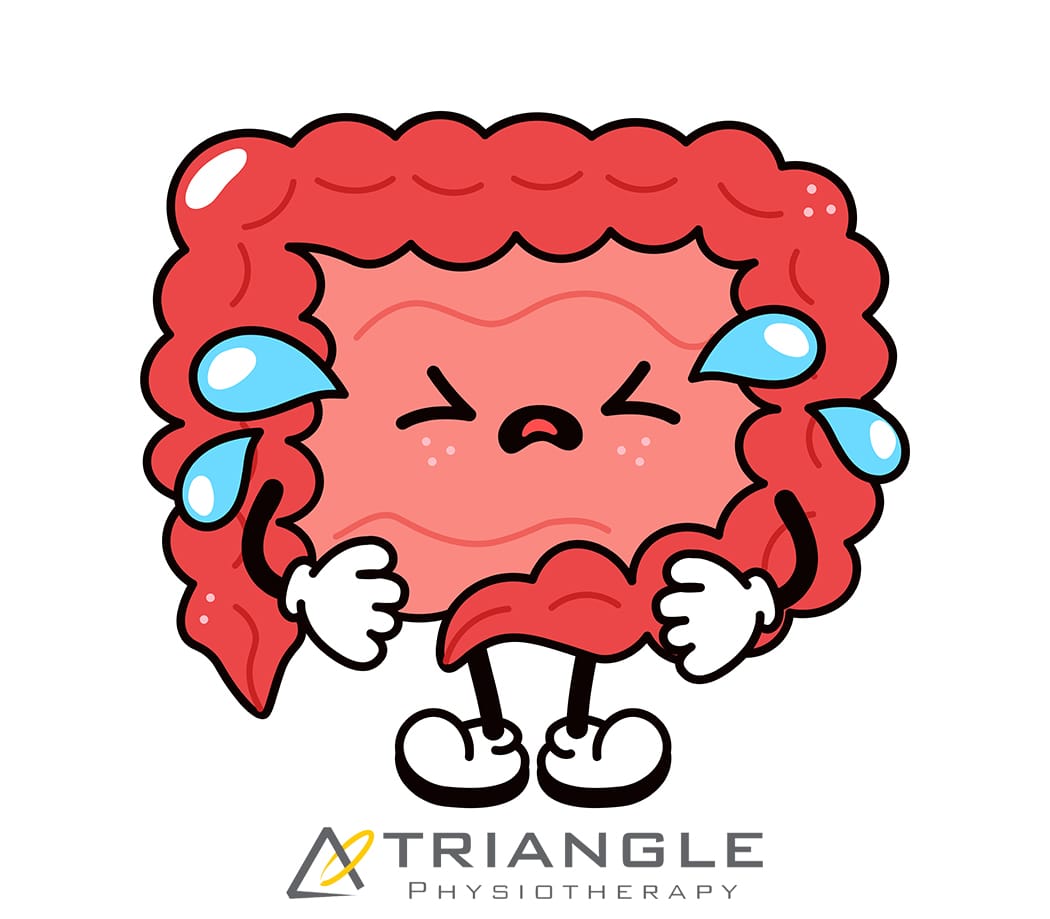
Leaky gut, also known as intestinal permeability, is a dysfunction in the lining of our intestine. Our intestinal walls are only one cell layer thick. Their job is to absorb nutrients and prevent bacteria from getting into our bloodstream. When the cells of the gut lining start to separate and let bacteria enter the bloodstream, we get what we call leaky gut. This can lead to all kinds of health issues, including:
- allergies
- asthma
- autoimmune disease
- eczema
- psoriasis
- rheumatoid arthritis
- food sensitivities
- irritable bowel syndrome
- Crohn’s disease
- ulcerative colitis
- thyroid problems
- acne
- nutrient deficiencies
- depression and other mood disorders
How does running lead to leaky gut?
It’s not just running that can lead to leaky gut. Powerlifters and people who do cross-fit are at risk, too. The same goes for anyone who does vigorous strength training or heavy exercise. The gut lining becomes more permeable due to the amount of stress put on your body by these types of activities. High physical stress leads to higher metabolic demands. Endurance sports do appear to have the most profound effect on leaky gut though, which is why you might be more concerned if you’re a marathon runner, cyclist, or triathlete.
When you exercise, plant-derived carbohydrates are digested and fermented by the gut. This can create some harmful byproducts that play a role in creating leaks in your gut. Once you have a leaky gut, toxins are more easily able to cross from your intestines into your bloodstream.
Endurance exercise can also increase our secretion of pro-inflammatory cytokines. This means that more inflammation is happening in the gut, which can throw off the balance of good bacteria versus bad bacteria in the intestines.
If you know me, you know I don’t like talking about health issues without some scientific studies to back up what I’m saying. So let’s take a look at one. Researchers looked at LPS (lipopolysaccharide) levels in athletes. They chose to look at LPS because it is a toxin found in bacteria. They measured LPS from blood samples of 29 athletes before, immediately after, one hour after, two hours after, and 16 hours after a triathlon. What they found was that LPS in the blood increased immediately after the race. But guess what? LPS was even higher than that one hour later. This demonstrated that there was an increase in leaky gut both during and after intense exercise.
I think I might have a leaky gut… now what?
Don’t hang up your running shoes just yet, folks. There might be a solution to those leaks in your gut. Remember how I mentioned that the balance between good and bacteria in the gut can get thrown off? Well, one way to help restore that balance is by taking probiotics. Probiotics are known as the good, healthy bacteria that we want and need in our gut. There are many different strains of probiotics. The two that are most helpful with leaky gut are called Lactobacillus and Bifidobacterium. These strains help cells of the intestinal wall to tighten up the gaps between them.
A study demonstrated that probiotic supplements reduced LPS levels in the blood. This led to a less leaky gut as well as an increase in the amount of time it took to reach fatigue while exercising in hot temperatures. This means that probiotics could help to improve athlete performance, too!
If you are a runner and suspect you may have a leaky gut, don’t wait until deteriorating health issues come along.

Click HERE to book an appointment with Dr. Corina Kibsey, ND today.
- Oakville Naturopath – Triangle Physiotherapy Oakville
- Naturopath in Mississauga – Triangle Physiotherapy Mississauga
- Downtown Naturopath – Triangle Physiotherapy King West
- Mississauga Naturopath – Triangle Physiotherapy Erin Mills
Running can sometimes lead to unexpected issues, such as muscle imbalances or injuries, that require professional care. If you’re a runner looking for expert physiotherapy services to prevent or treat running-related injuries, consider clinics in physiotherapy Etobicoke, Oakville, North York, Toronto, Lawrence Park, Queens Quay, Erin Mills, Mississauga, and Liberty Village. These clinics offer specialized care and personalized treatment plans to help you stay injury-free and perform at your best.





